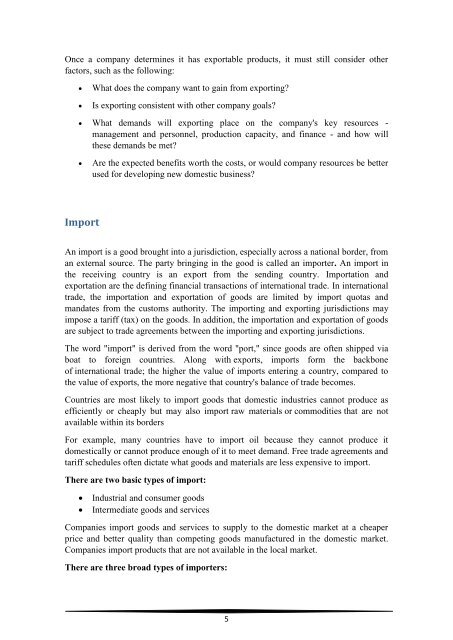Internationalization
Create successful ePaper yourself
Turn your PDF publications into a flip-book with our unique Google optimized e-Paper software.
Once a company determines it has exportable products, it must still consider other<br />
factors, such as the following:<br />
<br />
<br />
What does the company want to gain from exporting?<br />
Is exporting consistent with other company goals?<br />
What demands will exporting place on the company's key resources -<br />
management and personnel, production capacity, and finance - and how will<br />
these demands be met?<br />
<br />
Are the expected benefits worth the costs, or would company resources be better<br />
used for developing new domestic business?<br />
Import<br />
An import is a good brought into a jurisdiction, especially across a national border, from<br />
an external source. The party bringing in the good is called an importer. An import in<br />
the receiving country is an export from the sending country. Importation and<br />
exportation are the defining financial transactions of international trade. In international<br />
trade, the importation and exportation of goods are limited by import quotas and<br />
mandates from the customs authority. The importing and exporting jurisdictions may<br />
impose a tariff (tax) on the goods. In addition, the importation and exportation of goods<br />
are subject to trade agreements between the importing and exporting jurisdictions.<br />
The word "import" is derived from the word "port," since goods are often shipped via<br />
boat to foreign countries. Along with exports, imports form the backbone<br />
of international trade; the higher the value of imports entering a country, compared to<br />
the value of exports, the more negative that country's balance of trade becomes.<br />
Countries are most likely to import goods that domestic industries cannot produce as<br />
efficiently or cheaply but may also import raw materials or commodities that are not<br />
available within its borders<br />
For example, many countries have to import oil because they cannot produce it<br />
domestically or cannot produce enough of it to meet demand. Free trade agreements and<br />
tariff schedules often dictate what goods and materials are less expensive to import.<br />
There are two basic types of import:<br />
<br />
<br />
Industrial and consumer goods<br />
Intermediate goods and services<br />
Companies import goods and services to supply to the domestic market at a cheaper<br />
price and better quality than competing goods manufactured in the domestic market.<br />
Companies import products that are not available in the local market.<br />
There are three broad types of importers:<br />
5








